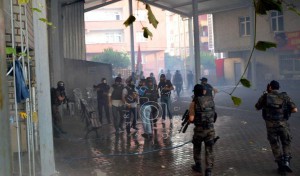(On 26 July 2015, Turkish police special forces stormed Gazi Cemevi, a place of worship for Alawites, with tear gas and rifles at Istanbul’s Gazi neighbourhood. The operation aimed at confiscating the body of Günay Özarslan, who was killed in a police raid two days before. Public funerals are a form of protest for the minorities in Turkey. Photo by Hayri Tunç.)
Rights groups have long been reporting Turkey’s ‘trajectory towards authoritarianism’. The story of a jailed Kurdish journalist highlights the plight of the two groups — minority ethnic Kurds and media workers — that have been hit hardest by this tendency.
Hayri Tunç, a Kurdish reporter from independent news website Jiyan, is facing years in jail for seven tweets, 11 Facebook posts and two YouTube videos.
Based on material in the posts, an Istanbul court charged placed him in February on pre-trial detention in Silivri prison on charges of ‘terrorism propaganda’, ‘abetting criminal acts’ and ‘glorifying criminal acts’.
Taking into consideration multiple counts, the charges arrayed could mean over 20 years in jail if he is convicted, although given Tunç has no prior criminal record, any sentence would likely be smaller.
Until recently, Tunç’s main area of work has been uncovering stories of exclusion and struggle in the slums of Istanbul where the Kurdish minority has resided for decades.
As a video-journalist he excels at documenting clashes between Leftist protesters and the Turkish police.
Videos from his own YouTube channel have reached thousands of viewers and have been featured in major outlets such as Russia’s RT and France 24.
His personal Twitter feed doubles as an independent newswire for 13.6K followers, thanks to his reporting from the other side of the Kurdish conflict.
But since last summer, when a low intensity conflict between the Kurdish armed group PKK and the Turkish state escalated into all-out guerrilla warfare, the Turkish government imposed a blanket censorship over Kurdish media by banning over a hundred independent news websites, including Jiyan.
(Disclaimer: the author of this report is an editor for Jiyan).
Among the subjects of Turkey’s numerous removal requests to Twitter were key Kurdish journalists, including Hayri Tunç.
Tunç’s account featured three times in such requests according to data reported by cyber rights activist and professor of law at Bilgi University in Istanbul Yaman Akdeniz: first in August, then in September, and once more in January.
Such persistence has helped Turkey become the top Twitter censor worldwide.
Facebook is less transparent in revealing government requests, but Tunç reported he lost access to his account several times, while Instagram removed his photos that documented clashes in Istanbul.
But when the government’s repeated censorship requests failed to silence Tunç, mainly because Twitter usually fails to comply with removal requests relating to journalistic content, police raided his home in October and detained him on grounds of ‘being a member of a terrorist organisation’ and ‘spreading terrorist propaganda’.
He was even accused of ‘polytheism’ during a police interrogation.
It is clear that Tunç is being punished for reporting on the conflict in real time, with tweets such as this one, from July 2015:
https://www.youtube.com/user/korkulukkitabevi/videos
Kurdish Reporter Faces Jail Time in Turkey for Twitter and Facebook Posts
